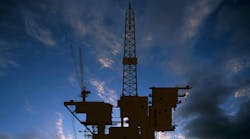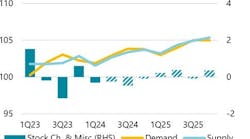By OGJ editors
WASHINGTON, DC, Dec. 19 -- An independent producer group said that new government surveys show there is reason to be optimistic that there is more undiscovered oil and gas within US public lands than once thought. However, producers say they are worried that the wide differences in various agency analyses, coupled with burdensome regulations, may mean that companies may find it difficult to bring that oil and gas to market.
This week the Department of Energy and two agencies within the Department of Interior —the US Geological Survey and the Bureau of Land Management—released surveys that assessed the amount of undiscovered oil and natural gas thought to be located within portions of the nation's public lands. The agencies also outlined the economic and technical recoverability of those resources and assessed their potential fiscal impact on the nation (OGJ Online, Dec. 17, 2002).
"Assessments of our nation's oil and natural gas resources are an important planning tool to help secure the energy our country demands for growth and economic security," said Diemer True, chairman of the Independent Petroleum Association of America. "The assessments released this week show great promise in our industry's ability to meet consumer demand, but we still see many variables within the reports, such as wide-ranging reserve estimates, that seem confusing and contradictory. Natural gas demand, in particular, is growing dramatically, and we need the most accurate assessment possible of our natural gas resources." True is partner with True Oil Co., Casper, Wyo.
IPAA cited the following reports:
-- "The 2002 National Oil and Gas Assessment." The US Congress mandated this Dec. 16 report by the US Geological Survey in its Energy Policy and Conservation Act Amendments of 2000. The report examines undiscovered resources in the five basins of the Rocky Mountain region. It states that a mean of about 183 tcf of undiscovered natural gas is available in the region. IPAA said that an important point in this report is that USGS substantially increased its assessment of coalbed gas in the Powder River basin (Wyoming and Montana) to 14.3 tcf from a mean estimate of 1.1 tcf in 1995.
-- "Powder River Basin Coalbed Methane Development and Produced Water Management Study." This report, commissioned by the US Energy Department's Office of Fossil Energy also looks at the enormous promise of gas reserves, specifically in the Powder River basin of Wyoming and Montana. Unlike the USGS report, however, IPAA noted that the DOE study concludes that 39 tcf of coalbed gas is recoverable in this region, not 14.3 tcf as assessed by USGS in 2002 (or the 1.1 tcf in 1995).
-- The Bureau of Land Management Reservoir Management Group. While both the USGS and DOE increased their assessments of undiscovered coalbed natural gas reserves in the Powder River basin, BLM released a report this week examining the cost of not developing the region in an expedited manner. According to BLM, delays in coalbed gas development have cost the public $52 million in federal royalties since 1987, IPAA said. "This updated cost study estimates that coalbed gas is being drained across underground property lines by wells in neighboring states and private wells in the basin. The basin cannot be developed until the government completes a Powder River basin environmental impact statement. BLM predicts 292 bcf of federally owned gas will be lost to private and state wells by 2005."
Next steps
IPAA called for a more coordinated effort by policy makers that follow oil and gas reserves so that producers can have a clearer understanding of what exactly is available to them.
"Clearly, coalbed natural gas will be an invaluable resource to meet the future energy needs of our nation" said Barry Russell, IPAA president. "In America, as always, independent producers explore and produce oil and natural gas better than any other country, with more attention to environmental concerns and the public well-being than anyone else.
"However, to develop this important resource, we need an accurate assessment of coalbed gas. And from the reports we've seen this week, the more time it takes to assess our resources, the more it costs the American people," Russell said.
"The government has done an important assessment and has made significant progress in its blueprints of the nation's resources," he said. Now we will await the Interior Department's next study that details public oil and natural gas resources that are currently restricted to exploration and development. This study, to be released shortly, will be another important tool for planning our nation's energy future," Russell said.

